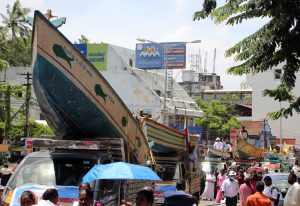Fishing community says the ₹7,500 crore project will affect its livelihood, but government continues to back Vizhinjam port.

Fish workers lay seige to the state secretariat in Thiruvananthapuram during a recent protest. (South First)
Opposition to the ₹7,500-crore Vizhinjam deep sea port project, being developed by the Adani group off the Thiruvananthapuram coast, is gathering strength, with a new “black flag” held on Tuesday, 16 August.
The protest, led by the Latin Catholic Archdiocese of Thiruvananthapuram — which has been standing with the coastal communities affected by the project — saw black flags being raised in front of the churches, institutions and households under the diocese.
The church, in a statement, also urged the state government to end its association with the Adani group and abandon the project, saying that it spelt doom for the coastal people, especially poor fish workers.
The day also saw fish workers affiliated to the diocese laying a siege to the project site at Vizhinjam, shouting ‘Adani Go Back’ slogans.
Hundreds have taken part in the protest inaugurated by Vicar General Eugene Pereira. And, over the past few weeks, protestors from the nearby fishing villages have intensified their movement against the project, saying it would kill fertile breeding grounds.

The Latin Church organised a black flag protest on 16 August against the Vizhinjam port project of the Adani group. (South First)
They are accusing the ruling Left Democratic Front of protecting the interests of the project executors, the Adani Vizhinjam Port Private Ltd (AVPPL), and say reclamation and dredging have already caused sea erosion about 80 km from the north of the port site.
As a result, they say, the turbidity of the seawater has increased, which in turn has disturbed the fishing grounds, leading to a sharp drop in catch and affecting the livelihood of hundreds of fishing families.
“Fishing activity will get reduced drastically when maritime traffic increases,” warns Charles George, general secretary of the National Fish Workers Forum.
“And once the project gets operational, there is the associated risk of coastal pollution.”
Standing alongside the coastal community is the church the bulk of them belong to — the Latin Catholic Church — with Archbishop Thomas J Netto and Auxiliary Bishop R Christudas leading from the front in a recent protest on 10 August.
The bishops say protests would continue till the Adani group and the government found a lasting solution to the continuing sea erosion. They claimed the erosion has killed over 60 people in the past two years and landed over 700 families in school buildings and warehouses converted overnight into relief camps.

Boats being taken to the state secretariat as part of the protest against the Vizhinjam port being constructed by the Adani group. (South First)
“The government has compelled us to come out on the streets as our followers have become homeless because of the project,” Pereira told South First.
A third prelate, retired Archbishop Soosa Pakiam of Trivandrum, was quoted in news reports as saying: “We have on several occasions told government officials, ministers and others about their plight. They made promises to settle the issue, but never acted on their promises that now look hollow.”
Demanding a fresh feasibility study, the prelate also noted that experts in the past had concluded that the proposed port was a major threat to the environment and local people.
The Vizhinjam deep sea port, which is projected to be “India’s first mega trans-shipment container terminal”, is being designed to handle megamax containerships; its capacity will be 7.2 million twenty-foot equivalent (TEUs) on completion.
But coastal experts and environmental activists are not excited, and have joined the church in demanding quick and lasting measures to dilute any adverse impact of the port construction.
“If the Adanis fail to address the survival struggles of the coastal community in Thiruvananthapuram, they must abandon the port project,”’ says AJ Vijayan, a coastal researcher who has been assessing the project since its inception seven years ago.
Vijayan, who heads People’s Vigilance Forum, a civil society group that coordinates protests against the project, is particularly appalled at the threat posed to the a 3000 sq km “Wadge Bank”, a fertile fishing ground in an ocean rich in biodiversity.
Also voicing concern is coastal researcher Nalini Nayak, who talks of the Shanghumukham beach in Thiruvananthapuram that has been completely submerged by the Arabian Sea. “The sea started advancing ever since the breakwater reef for the port was built,” says Nayak.
In fact, warns KV Thomas of the National Centre for Earth Science Studies, the coastal erosion at the Vizhinjam-Shanghumukham region would turn worse in the coming years.
“Unfortunately, the environmental and livelihood impacts of the project have not been assessed sufficiently or accurately,” says Thomas.
Plus, he says, the port has also been “irresponsibly sited”.

May 02, 2024

May 01, 2024

Apr 28, 2024

Apr 25, 2024

Apr 25, 2024

Apr 24, 2024